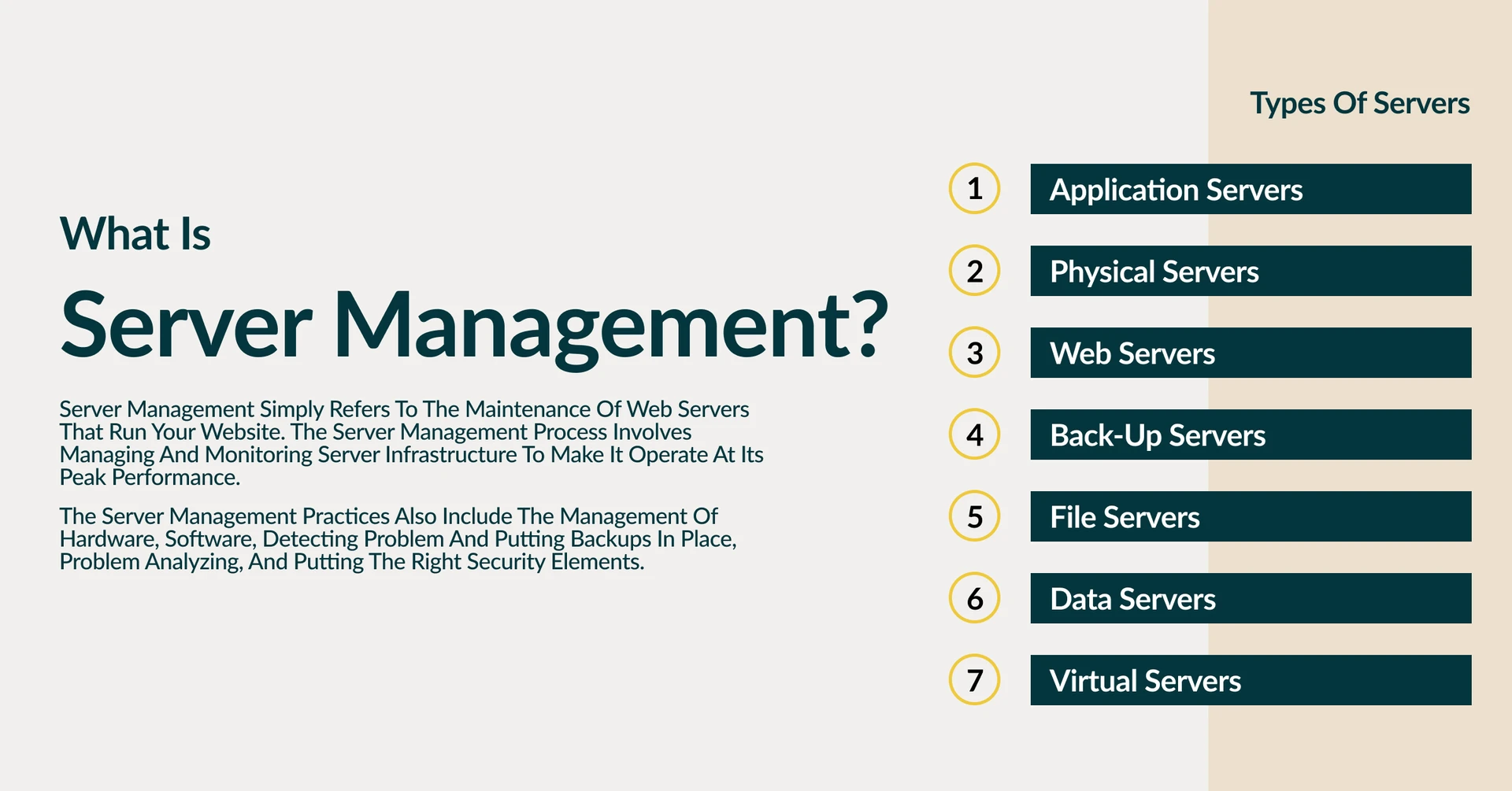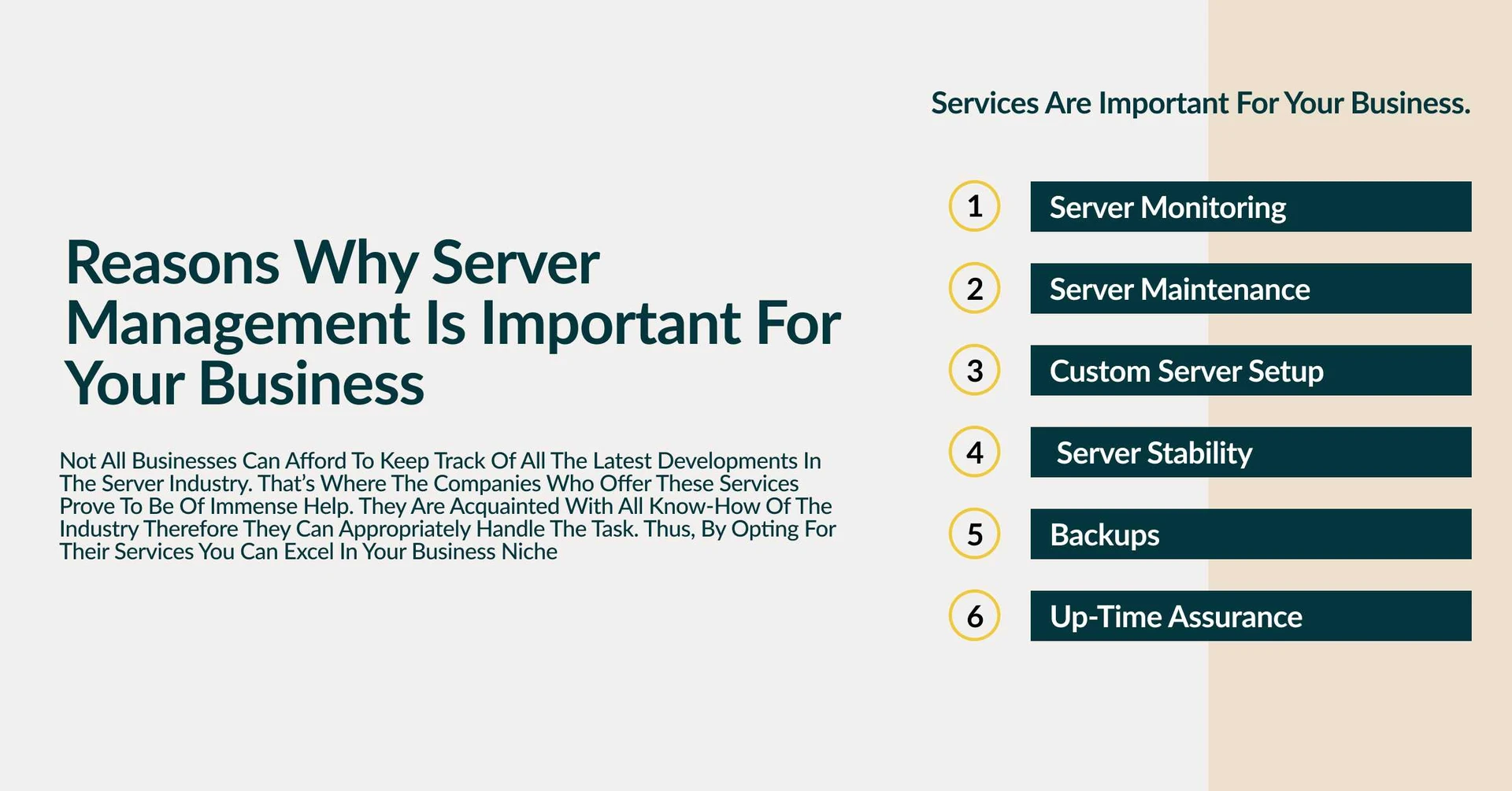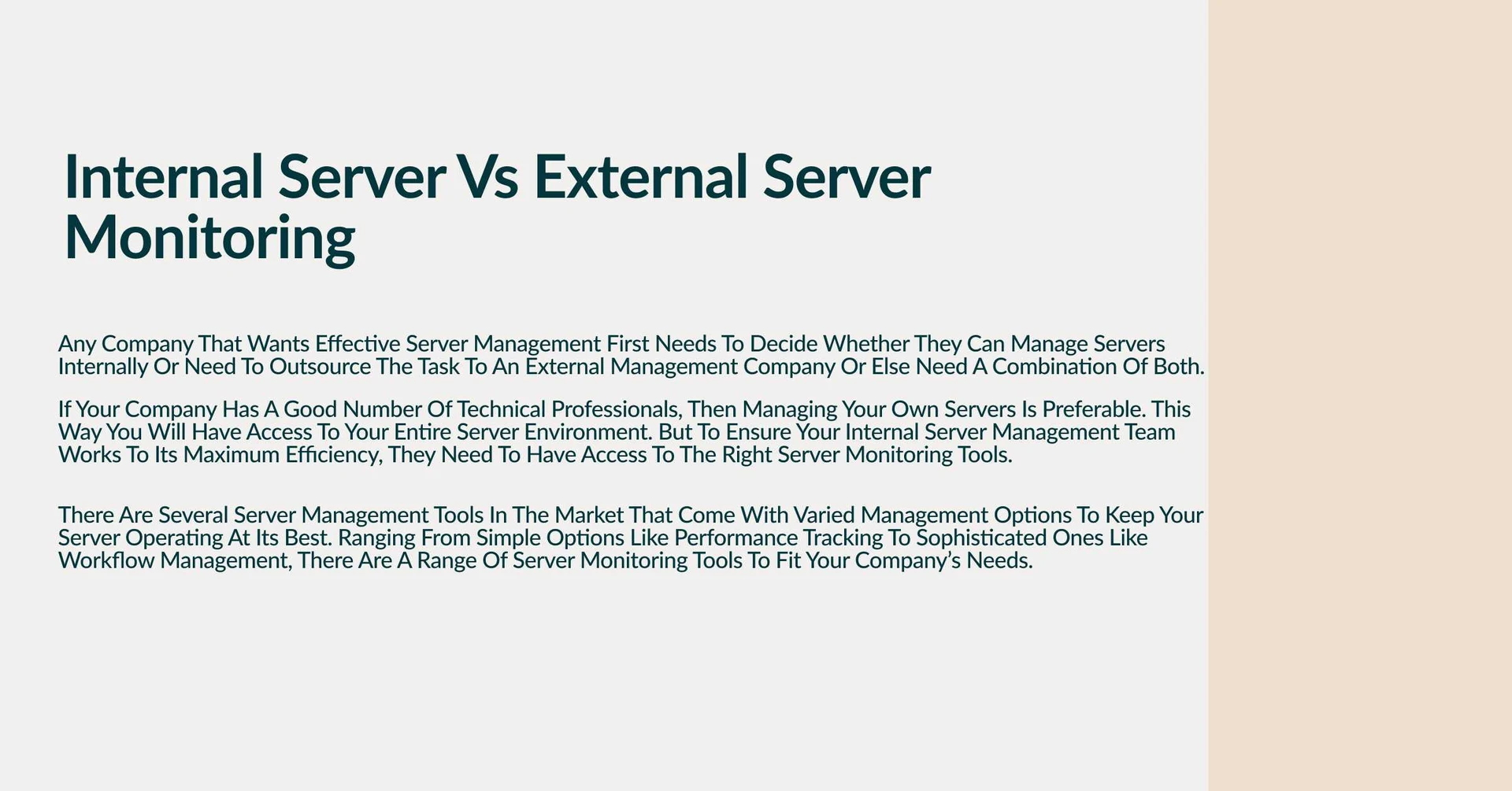It’s no wonder, that every business today, whether large or small needs technological tools and applications to flourish and sustain itself. For software development, they are connecting and working with the best web and app development companies.
When software is developed and launched, servers play an indispensable role in ensuring the smooth operation of any business, especially the ones involved in the IT sector.
The server is an integral part of an IT setup that acts as a central hub for the company network to facilitate easy communication and interaction between the IT devices connected.
Servers are fundamental for enterprises that wish to maintain an online presence and want to have a smooth website hosting experience to please clients. Therefore, effective server management is such a big deal. It is an essential requirement and not an option.
Not just server management, Effective server management
Effective server management, support, and maintenance services can make things easier and routine operations smooth for you. The facilities offered by server management service providers keep your web server running in top condition. Effective server management is very important but more than often companies fail to realize its potential benefits.
Well, that’s a big mistake and needs to be strictly avoided. The server’s default settings are not sufficient enough for the long term and thus outsourcing the server management task to a good server management company is crucial.
In this article, we’ll explore the importance of server management for businesses. But before we dig into the details, let us first understand the underlying concept- what server management exactly means and how it is beneficial for organizations.
PHP or Python: Which Language to Choose For Server-Side Development?
What is Server Management?

Server management simply refers to the maintenance of web servers that run your website. The server management process involves managing and monitoring server infrastructure to make it operate at its peak performance.
The server management practices also include the management of hardware, and software, detecting problems and putting backups in place, problem analyzing, and putting the right security elements.
The fundamental objective of effective server management encompasses:
● Creating a secure server environment.
● Mitigating the possibility of server slowdowns and downtime.
● Continuous server monitoring and upgrades to adjust it according to the evolving needs of an organization.
Nevertheless, not paying attention to the proper management of servers can lead to serious consequences. It may result in the start of a series of problems such as data loss or data theft.
The inconvenience caused due to these issues can have major implications for your business. As per the study, it has been found that 94% of companies that suffer data loss fail to recover.
Types of Servers
There are different types of servers according to requirements, these include:
- Application Servers
- Physical Servers
- Web Servers
- Back-up Servers
- File Servers
- Data Servers
- Virtual Servers
The aforementioned servers either run on a Linux or Windows environment. Both the physical and virtual servers require server management and support to operate to their optimum efficiency.
Pick a Smart Option for the proper functioning of servers
Effective server management begins with assigning the task to a dedicated technical team that can keep track of the server for technical faults and diagnose them on time if any. The provisions of server management services work on eliminating downtime to zero.
Apart from this, server management practices also entail providing continuous upgrades to the server for performance improvement.
The function of servers is not only limited to database storage rather it also play a crucial role in managing different business operations. Plus, it is also responsible for assembling all IT requirements and commands for promoting better functioning of the company along with enhanced coordination at every point of the business.
Failure of a server either due to configuration disruption, output disorder, or any other reasons can lead to significant data loss. This can bring your whole business to a halt.
Know How to Create a Scalable Peer-to-Peer Marketplace Website?
Data losses due to non-functional server issues are catastrophic for any company as they need considerable time and investment, which is not acceptable in the fast-moving business world.
Although it is a cause for worry, approaching technical experts can help simplify server management to a great extent. That’s why most companies consider outsourcing server management to trusted server management and support service providers.
The dedicated server management organizations provide you with superior-level professional services at affordable prices.
Reasons Why Server Management is Important for Your Business

Not all businesses can afford to keep track of all the latest developments in the server industry. That’s where the companies who offer these services prove to be of immense help. They are acquainted with all the know-how of the industry therefore they can appropriately handle the task. Thus, by opting for their services you can excel in your business niche.
Reasons Why Dedicated Server Management Services Are Important For Your Business
1. Server monitoring
Taking care of the server involves keeping watch on it all day and the process starts with server monitoring. Server monitoring refers to tracking and analyzing key metrics that influence the performance of your server.
With continuous monitoring, your business can function at its optimum efficiency. Also, it makes you aware of upcoming issues before time so that they do not impact your business’s real-time performance.
Another benefit of server monitoring is that it provides a comprehensive look into your company’s IT infrastructure to assist in the formulation of future business expansion strategies. Therefore, it is important to have an active server management team for server monitoring.
2. Server maintenance
Lack of server maintenance is likely to raise issues impacting your business performance. Server management companies take the responsibility of performing regular audits, software updates, backups, security checks, and restoration processes to ensure good server performance. While the server software, preventative measures, and security features require timely updates of which your company might not be aware.
For this you need dedicated professionals to work 24*7 as and when required. Moreover, your server is also likely to face day-to-day problems that might need frequent changes in server settings. For the best possible changes, help from server management experts is preferable.
3. Custom server setup
As previously discussed, there are different types of servers depending on the requirement. The server configuration for a WordPress blog is quite different from the one needed for an e-commerce website. Thus, your service configuration depends on your business needs.
Server management professionals conduct an in-depth analysis of your business hosting and server requirements to find suitable server settings and specifications customized according to your business type.
For the initial server setup, tested strategies from the industry are implemented for configuration. This is done to ensure maximum server performance while eliminating the risk of cyber-attacks and exploits.
Know About How to Choose the Right Software Development Partner
4. Server stability
Server stability depends on multiple factors such as load times, server software, speed, service up-time, etc. Even a slight variation in server configuration can bring down the performance of the entire server. Therefore, it is better to seek professional assistance for server performance tuning.
Dedicated server professionals administer your server completely and provide server timely software updates to avert the risk of rising conflicts and downtime. In addition to this, they also scrutinize and re-optimize other server performance parameters like database lag and page load times.
5. Backups
Data loss situations can be traumatic. They can considerable loss to your business. As revealed by a study, 60 percent of small businesses that experience data loss close within six months. As such, having data backups is very critical for your business.
Since troubles are unavoidable, it is better to prepare yourself for such unexpected events. Hire a server management company to take up the task of keeping your data safe and secure. Server management professionals provide you the ease of mind by creating regular data backups.
So even if your server has become non-functional, you have your data at your disposal.
6. Up-time assurance
Uptime is the requirement of every online business. If a server cannot assure you up-time during peak service hours then likely you’ll lose your customers. This uptime reduction poses a risk to your businesses therefore to address this, you need expert server management.
Effective server management can make your servers run 100% of the time so that your services are available all the time. Well, this is possible through round-the-clock server management and support.
Server management companies take up the task professionally and provide you with 24/7 support, no matter what time of day it is.
Internal Server vs External Server Monitoring

Any company that wants effective server management first needs to decide whether they can manage servers internally need to outsource the task to an external management company or else need a combination of both.
If your company has a good number of technical professionals, then managing your own servers is preferable. This way you will have access to your entire server environment. But to ensure your internal server management team works to its maximum efficiency, they need to have access to the right server monitoring tools.
There are several server management tools in the market that come with varied management options to keep your server operating at its best. Ranging from simple options like performance tracking to sophisticated ones like workflow management, there is a range of server monitoring tools to fit your company’s needs.
How to Choose the Best Server Management Tool
Puzzled over choosing the right server management tool? To initiate your research by looking for software that offers you both – operating systems monitoring and IT infrastructure monitoring. Next, ask yourself these two important questions:
- Does your server management software have all-in-one monitoring? An ideal server management software should offer you monitoring across applications, systems, and any existing or upcoming “Anything as a service” Xaas planned services.
- Is the software capable of performing analytics functions like diagnosing root causes of server issues?
With answers to these questions, you can find software that can meet your organization’s current as well as future needs.
What are the key components of effective server management?
Effective server management involves various components, including:
Monitoring and Performance Optimization: Continuous monitoring of server performance, resource usage, and network traffic to identify bottlenecks, optimize configurations, and ensure optimal server performance.
Security Management: Implementing robust security measures, including firewalls, access controls, intrusion detection systems, and regular security updates, to protect servers from cyber threats and data breaches.
Backup and Disaster Recovery: Regularly backing up server data and implementing disaster recovery plans to ensure data integrity and quick recovery in the event of hardware failures, natural disasters, or other unforeseen circumstances.
Patch Management: Regularly applying software updates, security patches, and bug fixes to keep servers up to date and protected against vulnerabilities.
Capacity Planning: Analyzing server usage patterns, forecasting future demands, and scaling server resources accordingly to ensure optimal performance and accommodate business growth.
Proactive Maintenance: Regular hardware and software maintenance, including hardware inspections, firmware updates, disk defragmentation, and performance tuning, to prevent potential issues and ensure server reliability.
What Are the Risks of Poor Server Management?
Poor server management can lead to various risks and consequences:
Downtime and Productivity Loss: Inadequate maintenance and monitoring can result in unexpected server failures and extended downtime, leading to productivity loss, disrupted operations, and dissatisfied users or customers.
Data Breaches and Security Threats: Servers with outdated security measures or misconfigurations can become vulnerable to cyber attacks, data breaches, and unauthorized access, potentially compromising sensitive information and damaging reputation.
Inefficient Resource Utilization: Lack of proper management may lead to inefficient resource allocation, such as underutilized servers or overloaded systems, resulting in wasted resources and unnecessary costs.
Compliance Violations: Poor server management practices can lead to non-compliance with industry regulations and data protection laws, resulting in legal consequences and financial penalties.
Lack of Scalability: Inadequate planning and management can hinder the ability to scale server infrastructure to meet growing business needs, causing performance issues and limiting potential expansion.
Server Management is a Necessity Today
Today IT server management is a necessary requirement. Effective server management practices ensure that your IT systems function at their maximum potential. They provide you assurance of server security, up-time, and prompt resolutions in case of any issue. Thus, effective server management can help you address all server performance inefficiencies.
But the most important thing to consider is to opt for professional server management services. Leaving the job to inexperienced management can bring down the server and can cause immense damage to your business.
Therefore, always rely on a trustworthy Server Management Company. The server management specialists from these companies are experienced and can handle issues before they affect your clients. Moreover, they also guide you on preventative steps to keep viruses, malware, and other security breaches at bay.




